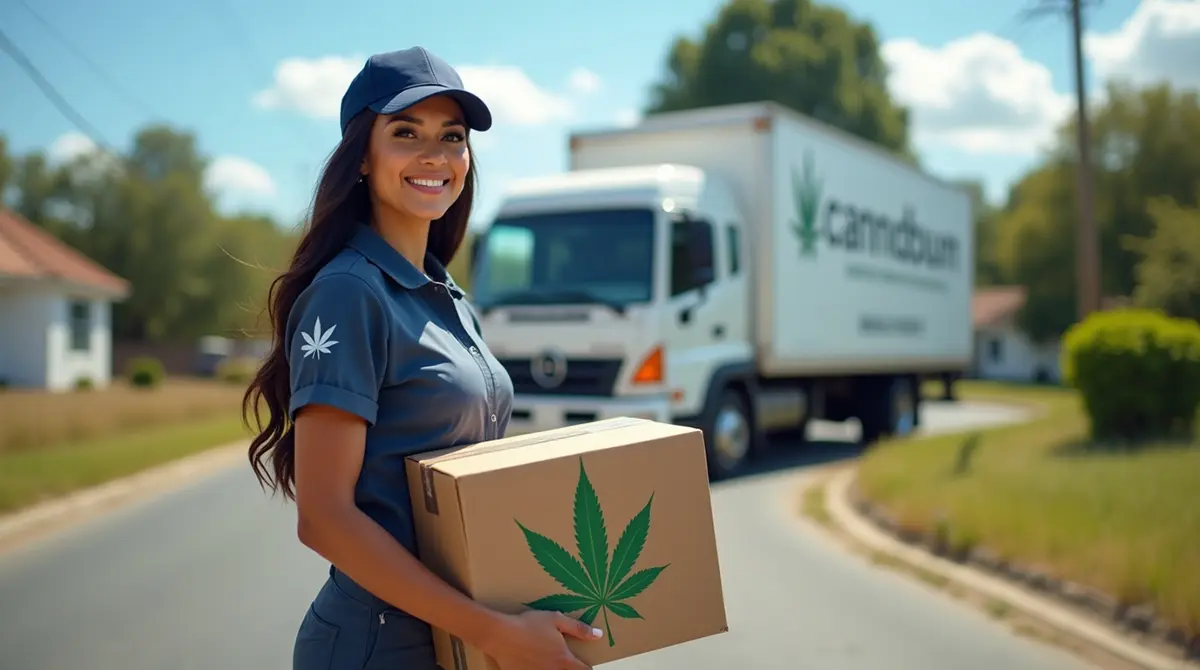Blog
How to Understand THC and Hemp Shipping Laws in 2025: A Consumer Education Guide

Written by the Get Bud Online Team, Reviewed by a Cannabis Compliance Expert
Disclaimer:
This article is for educational purposes only. It does not provide legal advice or encourage the purchase, sale, or shipment of controlled substances. Always verify the laws in your state or country and consult a qualified attorney or licensed professional before making any decisions related to cannabis or hemp products.
Introduction
The cannabis and hemp industries continue to evolve rapidly. For consumers, that evolution often raises a simple question: what can and cannot be shipped legally in 2025?
Over the past decade, legislative updates, federal guidelines, and state-level reforms have reshaped how products containing THC (tetrahydrocannabinol) and CBD (cannabidiol) are manufactured, marketed, and delivered.
While online searches for “THC cartridges,” “hemp vapes,” and similar terms have exploded in popularity, the shipping of these items remains tightly regulated. Understanding the difference between federally legal hemp-derived products and marijuana-derived items is essential for anyone who values compliance and safety.
This comprehensive guide from Get Bud Online explains the 2025 landscape for consumers, businesses, and anyone curious about how cannabis and hemp products move within legal frameworks.
1. The Legal Foundation: Federal vs. State Authority
Federal Overview
Under the Controlled Substances Act (CSA), marijuana—defined as cannabis containing more than 0.3% delta-9 THC by dry weight—remains a Schedule I substance at the federal level. That classification means it cannot legally cross state lines or be mailed via federal carriers such as the U.S. Postal Service.
The 2018 Farm Bill, however, carved out a crucial exception: hemp. Hemp is defined as cannabis with less than 0.3% delta-9 THC and is federally legal for cultivation, processing, and interstate transport. Products derived from hemp—including CBD oils and certain minor cannabinoids—may be sold and shipped if they meet all federal and state requirements.
State-Level Variations
Even though hemp is federally legal, state governments retain the right to restrict or ban certain hemp-derived cannabinoids. Some states regulate compounds like delta-8 THC, delta-10 THC, and THC-O more strictly than others.
States that have legalized recreational or medical cannabis often allow in-state delivery through licensed dispensaries, but that permission does not extend across state borders.
2. Key Terms Every Consumer Should Know
- THC (Tetrahydrocannabinol): The main psychoactive component of cannabis.
- CBD (Cannabidiol): A non-psychoactive compound derived from cannabis or hemp.
- Hemp-Derived Cannabinoids: Compounds such as delta-8, delta-10, HHC, or CBD extracted from hemp plants.
- COA (Certificate of Analysis): A third-party laboratory report verifying cannabinoid content and product purity.
- YMYL (Your Money or Your Life): A Google term describing topics that can impact consumers’ health, safety, or finances—such as cannabis laws or product safety information.
By understanding these terms, readers can navigate online information more confidently and avoid misinformation.
3. Why Shipping Laws Matter in 2025
Consumers often assume that if something can be bought online, it can also be shipped anywhere. That assumption can lead to legal or financial risk.
In 2025, federal enforcement remains focused on interstate transport of marijuana-derived products. Companies that claim to deliver THC vapes or marijuana products across state lines may violate federal law—even if both the origin and destination states have legalized cannabis.
Hemp-derived products are different. Provided they meet the 0.3% THC threshold and comply with FDA labeling, packaging, and testing standards, they may be shipped nationwide. However, carriers and payment processors often apply their own restrictions to minimize risk.
4. Hemp-Derived vs. Marijuana-Derived Products
| Feature | Hemp-Derived Products | Marijuana-Derived Products |
| THC Content | ≤0.3% Delta-9 THC | >0.3% Delta-9 THC |
| Federal Status | Legal under 2018 Farm Bill | Controlled under CSA |
| Interstate Shipping | Permitted (with restrictions) | Prohibited |
| State Regulations | Vary by jurisdiction | Must remain within legal states |
| Common Forms | CBD oils, weed gummies, hemp vapes | Medical/recreational cannabis, THC cartridges |
Educational takeaway: Consumers should always verify product labels and COAs before purchase.
5. How Compliance Works
Testing and Verification
Reputable hemp brands send their products to independent, ISO-accredited labs for testing. The resulting Certificate of Analysis shows exact cannabinoid levels and screens for pesticides, solvents, and heavy metals.
When evaluating any hemp or cannabis-related website, including Get Bud Online, look for transparent testing data, clear labeling, and consumer education resources. These are hallmarks of responsible business practices that align with Google’s focus on trust and transparency.
Packaging and Labeling
Compliant products must list:
- Total THC content
- Manufacturer name and contact information
- Batch number and lab reference
- Ingredient disclosure
These details not only protect consumers but also support legal defensibility if products are questioned in transit.
6. Carrier and Delivery Considerations
Different shipping providers maintain distinct policies:
- USPS: Permits hemp shipments meeting Farm Bill standards, provided proper documentation is available.
- FedEx and UPS: Allow certain hemp-derived products but often prohibit vape devices or liquids.
- Local couriers: In legalized states, licensed online cannabis dispensaries may contract specialized couriers for in-state delivery.
Each carrier’s rules evolve, so consumers should check official websites or request written confirmation before shipping or receiving hemp-based items.
7. How Consumers Can Stay Compliant
- Research state laws. Many state cannabis control boards publish official guidance online.
- Confirm hemp source and COA. Ensure the product meets the 0.3% THC threshold.
- Avoid unverified sellers. Look for licensing details and physical business addresses.
- Be cautious with language. If a site promises “nationwide THC shipping,” it likely violates federal rules.
- Use educational resources. Websites like Get Bud Online can help consumers understand compliance trends and safe purchasing practices without promoting unlawful activity.
8. The Rise of Hemp Innovation in 2025
As technology advances, new extraction methods have improved the consistency and safety of hemp-derived cannabinoids. Companies increasingly focus on consumer transparency, sustainability, and data-backed quality claims.
Educational platforms and online directories now help users compare lab-tested, compliant hemp products. These directories play a vital role in helping customers make informed decisions, much like Get Bud Online does by publishing updates about evolving hemp standards and product testing methods.
9. Safety and Consumer Awareness
The 2020 vaping illness crisis taught the industry that unregulated products pose real health risks. Responsible manufacturers responded by improving testing, eliminating unsafe additives, and providing clear usage guidelines.
Consumers should always check for:
- Third-party lab certification links
- Clear warnings against underage use
- Ingredient transparency and expiration dates
Such diligence supports public health while strengthening legitimate industry players that prioritize safety.
10. Looking Ahead: The Future of Cannabis Shipping Laws
Policymakers continue to debate the federal classification of cannabis. If rescheduling or decriminalization occurs, future shipping models may change dramatically.
In the meantime, educational awareness is the best protection for consumers. Platforms like Get Bud Online can serve as neutral guides—helping people understand distinctions between hemp legality and marijuana regulations, without encouraging any transaction or shipment that violates law.
Forecast for 2025–2026:
- Increased coordination between state cannabis agencies
- More uniform packaging and testing rules
- Continued federal caution around THC shipping
- Growth of hemp-based minor cannabinoids within regulated limits
11. How Search Transparency and E-E-A-T Apply
Under Google’s Helpful Content and Search Quality Rater Guidelines, pages about legal or health-related topics fall under YMYL (Your Money or Your Life) categories.
To align with these standards:
- Authors and reviewers must demonstrate expertise (for example, legal or scientific credentials).
- Content should be fact-checked and transparent about its purpose.
- Readers should leave feeling informed, not misled or pressured to buy.
This educational post follows those guidelines by emphasizing consumer safety, verified information, and responsible sourcing.
12. Frequently Asked Questions (FAQ)
Q1: Can THC products be shipped across state lines?
No. Products containing more than 0.3% delta-9 THC remain federally restricted and cannot legally cross state borders.
Q2: Are hemp-derived vapes legal to ship?
They may be shipped within the United States if they meet federal and state hemp guidelines and carrier restrictions.
Q3: How can I verify a product’s legality?
Ask the seller for a current Certificate of Analysis and check state cannabis or hemp regulations.
Q4: Does federal legalization seem likely soon?
Rescheduling proposals are under review, but as of 2025, federal prohibition remains in place. Always rely on official government updates.
Q5: Where can I learn more about hemp and cannabis law?
Visit state Department of Agriculture or Cannabis Control websites, the U.S. Department of Agriculture’s hemp resources, or educational portals like Get Bud Online for compliance guides.
Conclusion
The intersection of cannabis, hemp, and e-commerce law is complex—but knowledge empowers consumers to make safer choices.
By distinguishing between hemp-derived and marijuana-derived products, confirming lab results, and respecting state and federal boundaries, individuals can remain compliant and informed.
Websites such as GetBudOnline.com serve a crucial role in this process by educating readers, sharing compliance updates, and reinforcing transparency across the industry.
References:
DEA. (nd). The Controlled Substances Act. Available at: https://www.dea.gov/drug-information/csa
Wikipedia. (2025, September 26). Agriculture Improvement Act of 2018. Available at: https://en.wikipedia.org/wiki/Agriculture_Improvement_Act_of_2018







